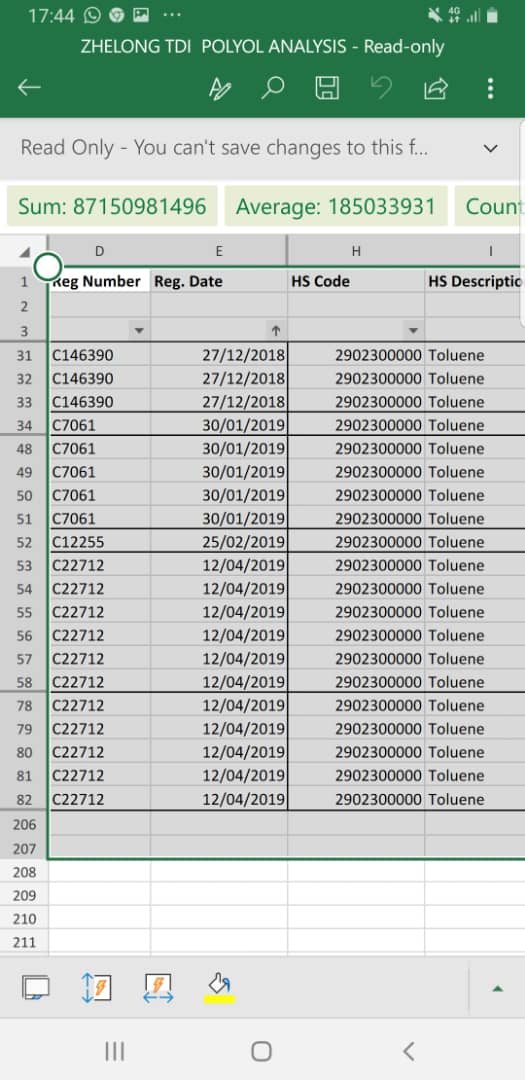Security agencies have raised their antenna to rein in the activities of a Chinese company allegedly involved in series of infractions that border on trade, immigration and also compromise the nation’s security.
The Company, Zhe Long Limited, owned by two Chinese: Wang Fuzeng and Chen Yuping, has as its main objective: “to carry on business as manufacturer, buyers, sellers, traders, importers, exporters, merchant exporters, departmental stores, distributors, stockists, dealers, packers, re-packers, and agents for all sponge mats and foam products.”
The company, according to search at the Corporate Affairs Commission, was incorporated in Nigeria on the 11th January, 2018 with an official address at 4, Eric Moore road, Surulere, Lagos.
Investigations revealed that the perfidy from Zhe Long ranges from false declaration, tax evasion, forgery, illegal immigration, concealment and customs duty evasion.
For instance, it is uncovered that the commercial sales invoices of the company is not VAT compliance since there are no VAT number and amount declared on the document. This to tax experts, constitutes a serious breach of the law by Zhe Long and its customers.
Apart from this, it is discovered that there are about 30 Chinese semi-skilled/manual workers operating in the company. A source in the company revealed that none of these workers has a formal CERPAC documentation, which is clear breach of the nation’s immigration law by both company and the illegal immigrants.
In the areas of import and shipping documentations, sources revealed that Zhe has been falsely declaring a chemical known as Polyol as Polyacetals. Polyols are a group of low-digestible carbohydrates derived from the hydrogenation of their sugar or syrup




Polyols react with isocyanates to make polyurethanes, which find use to make mattresses, foam insulation for refrigerators and freezers, home and automotive seats, elastomeric shoe soles, fibers (e.g. Spandex), and adhesives.
On the other hand, polyacetal is an engineering thermoplastic used in precision parts requiring high stiffness, low friction, and excellent dimensional stability. It is among plastic materials, with the most crystalline structure. It is also is known for its good fatigue/creep resistance, low friction and good performance in cold temperature.
Sources at the Customs explained that the reason for this false declaration is that Polyacetals global pricing is US$6,000/metric tonnes as against US$2,000 Polyol.
Similar to the above, the company is also accused of declaring a chemical called TDI as Toluene. Global pricing of Toluene is US$6, 000 as against TDI’s US$2,300
The consequence of this false declaration according to experts, is duty under-payment and the consequent defrauding of the government of necessary duty and VAT on these transactions.
Aside the loss of revenue accruing to the government, there is major security implication for the false declaration of TDI. Apart from a chemical used in the production of polyurethanes, primarily for flexible foam applications including furniture, bedding and carpet underlay, as well as packaging applications, TDI is also used in the manufacture of coatings, sealants, adhesives and elastomers.
But due to TDI’s potential explosive properties, the material is a controlled substance that requires an End User Certificate, EUC issued by the office of the National Security Adviser, NSA for its importation to Nigeria.
Sources close to the company alleged that presently there is no evidence to support that Zhe Long has EUC for its TDI’s importation, which according to security experts, constitute a serious national security breach.
Recently, Mckinsey, a global consulting firm, says out of the 930 Chinese companies operating in Nigeria, only 317 are documented by the Chinese ministry of commerce.
According to a new research report titled ‘Lions on the move II: Realising the potential of Africa’s economies’, there are over 10,000 operational Chinese firms spread across the manufacturing, construction, trade, services and real estate sectors in Africa.
Mckinsey added that these firms employ 300,000 local workers and as at 2015, a third of them reported about 20 percent profit.
 Hottestgistnaija.com
Hottestgistnaija.com




